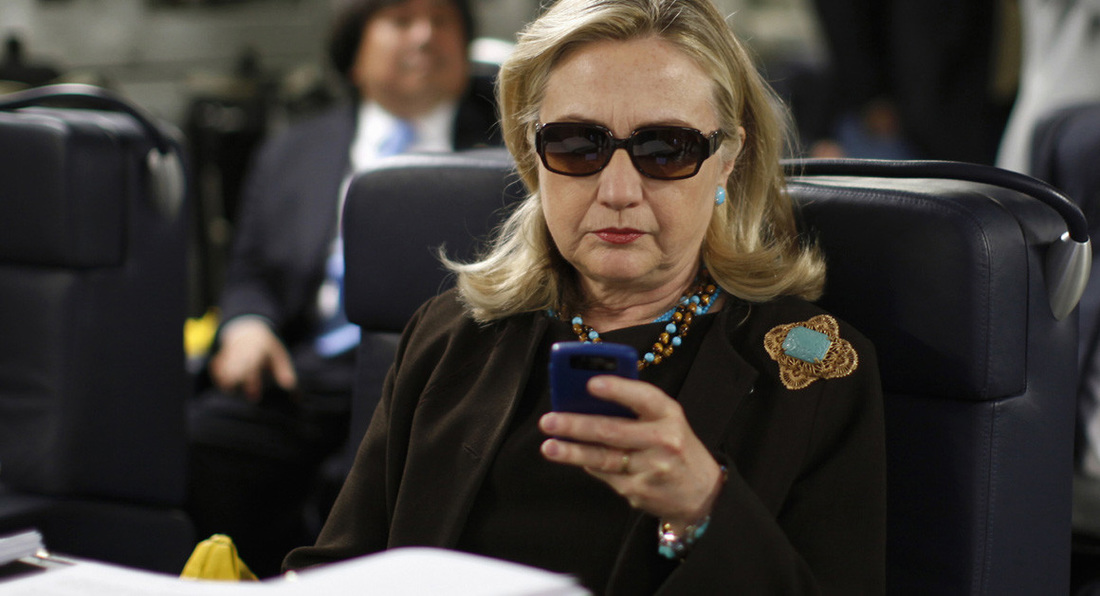 Famous photo of then-Secretary of State Hillary Clinton using her BlackBerry in 2011. | AP Photo Famous photo of then-Secretary of State Hillary Clinton using her BlackBerry in 2011. | AP Photo by Kate Clark Just last weekend, my mother got into a fight with American Airlines on Twitter. I had a particularly rough customer service experience, and she decided to seek retribution. Her daughter was upset, and there was hell to pay. Many tweets were exchanged. The a-ha moment occurred later, when discussing the incident with a friend who responded, “sometimes Twitter is the only way to get things done.” Is it not nearly inconceivable that a social media platform that only allows 140-character-or-less messages would be our preferred form of communication, particularly with people we may never encounter day-to-day? For example, let’s look at the presidential election. We have heard repeatedly about the candidates’ campaigns, and I bet you, like me, have heard seemingly endless talk of their Twitter activity. From the (in)famous 3:20 AM tweets from Donald Trump, to #HillaryforPrison hashtags, Twitter has become one of the most popular ways for candidates to reach out directly to their constituents. So it seems only natural to ask, has Twitter had an impact on the election? As I type this article, 4 days before the general election, Donald J. Trump has 12.9 million followers on Twitter. Meanwhile, Hillary Clinton has 10.1 million followers. This means, in a few easy clicks, the candidates have instant access to millions of people, and the public has the ability to voice their support easily through publishing tweets of their own, retweeting or favoriting candidates and other supporters, and generating hashtags that can spread like wildfire. Not only are real people weighing in on political debates and hashtags on Twitter, but autobots are also participating. Autobots are computer-based accounts that produce automated posts on Twitter, and can favorite, retweet, reply to tweets, and even send direct messages to users. It seems that both candidates and their supporters are using countless “bots” on Twitter to create buzz and feign popularity, however recent data has shown Trump-favoring bots have out-tweeted Clinton-favoring bots seven to one. Bots accounted for nearly 25% of Twitter traffic during the last presidential debate, and hacking groups have been accused of using Twitter bots to influence the election. However, due to their mysterious, hard to track sources and ability to blend in with regular Twitter users, there is little regulation for the use of bots. This prolific use of bots throws a wrench into the equation of how to interpret political power in terms of Twitter followers. Donald Trump likes to quote his follower count often, using it as evidence that he has widespread support in challenging Hillary Clinton. In fact, some have said that social media is one of the only places Trump seems to be ahead of Clinton in the race, whereas polling data consistently shows Clinton in the lead. It is true that Trump supporters have used Twitter liberally to spread their message, creating hashtags such as #CrookedHillary, and the latest: #DraintheSwamp. This week, when Twitter chose to censor the hashtag #HillaryforPrison, it incited chaos and mass outrage among Trump supporters, triggering the creation of the purposefully-misspelled #HillaryforPrision. It goes to show that many citizens will go to great lengths to use Twitter for political activism. So then, we may ask ourselves, what does this mean for the future of politics? It seems there are both positive and negative implications. On one hand, the increased accessibility allows candidates to connect with their constituents in new ways, and allows for unprecedented information-sharing and discussion. However, we’ve seen how the instantaneous (and often impulsive) nature of Twitter can backfire for candidates, emphasizing the need for further discretion and discipline. We can be sure that this election is just the one of many in which social media, and Twitter in particular, will play a major role. Although Twitter has encountered financial troubles throughout the past several years, in its ten years of existence, it has played a key role in several political movements, including the Tea Party movement, the Arab Spring, and Black Lives Matter. While unreliable, Twitter elements such as follower counts and hashtag prominence can serve as signals of each candidates’ support, leading the public to believe a candidate has more support than they actually do. Twitter has the potential to create more accessible debate and discussion, however the more likely outcome is a political echo chamber, where members only see and hear the side of a debate that they already support. This could lead to cognitive failures in deciding one’s vote, including confirmation bias emphasizing evidence that supports voters’ existing beliefs, and an increase in the influence of the availability heuristic as sensational tweets may be more memorable in the voting booth than data and policy platforms. On a lighter note, the Obama Administration has picked up on the importance of Twitter and other social media, and has outlined a clear strategy to both maintain soon-to-be former President Obama’s social media presence while handing over the @POTUS Twitter handle to whomever wins on November 8th for their personal use.
0 Comments
Your comment will be posted after it is approved.
Leave a Reply. |
Categories
All
Archives
April 2022
|
ADDRESSVirginia Policy Review
235 McCormick Rd. Charlottesville, VA 22904 |
|
SOCIAL MEDIA |